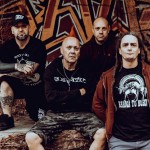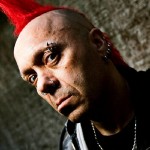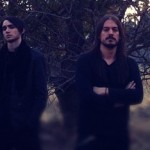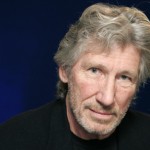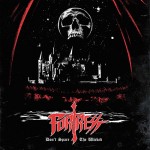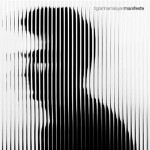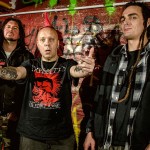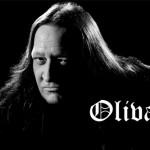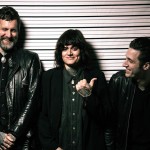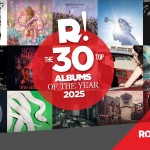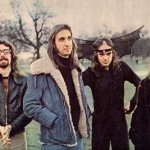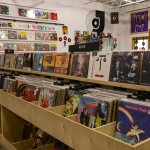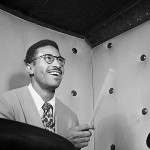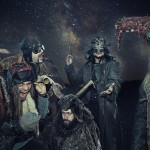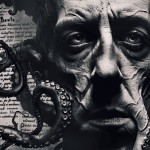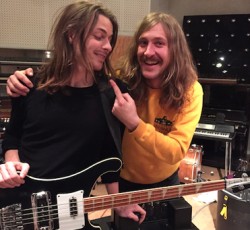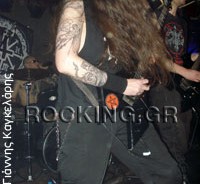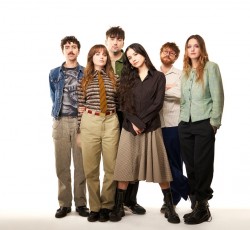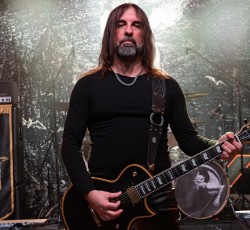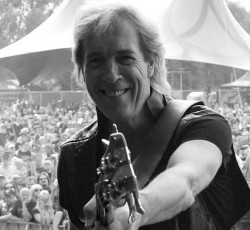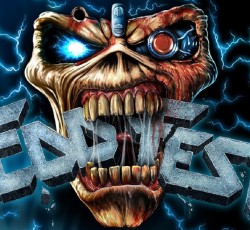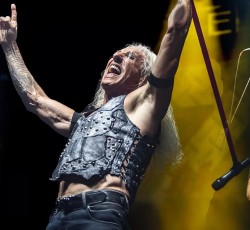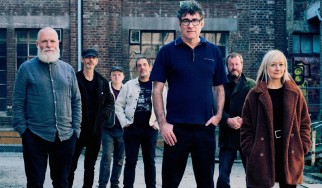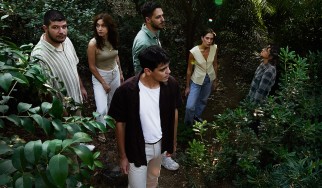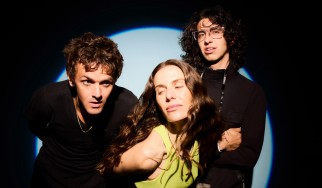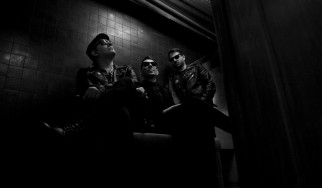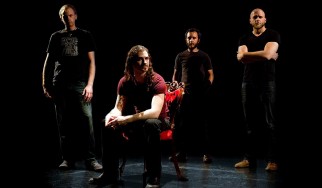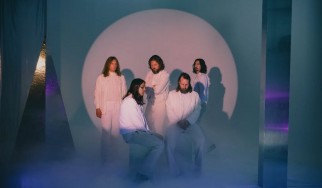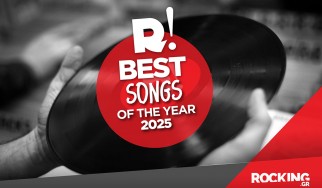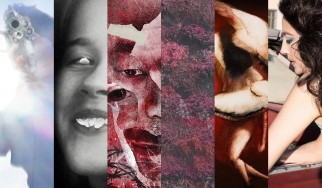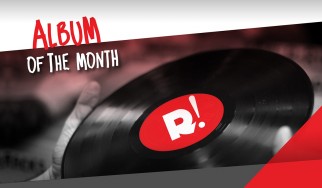Cypress Hill: "It's not the time to be talking about partying. We need to be educating people"
Multi-skilled percussionist Eric Bobo in an all-encompassing interview about the hip-hop legends’ long-awaited return to Greece, and (hip-hop & rock) music in general
Μπορείτε να διαβάσετε την ελληνική εκδοχή της συνέντευξης εδώ.
There isn’t much left unsaid about Cypress Hill. As one of the most iconic and influential groups in hip-hop history - and beyond - they return to Greece this summer for a much-anticipated live performance headlining Rockwave Festival. We seized the opportunity to connect with the legendary group, and speaking on their behalf was none other than the seasoned Eric "Bobo" Correa, the band’s percussionist for over three decades.
In a candid and passionate interview, Bobo offered insight into the rich musical universe and enduring legacy of Cypress Hill. From the early influence of his renowned father and his formative years with the Beastie Boys, to the road ahead for Cypress Hill, Bobo was both eloquent and engaging throughout our conversation.
He took us behind the scenes of the group’s bold collaboration with the London Symphony Orchestra, reminisced of the "Judgement Day" soundtrack and the connection of hip-hop & rock over the years, reflected on the need to bring politically conscious music back to the forefront, and shared his thoughts on the evolution - and current state - of hip-hop. Bobo also spoke openly about the challenges facing younger musicians today, as well as the raw, leveling power of live performance, that he characterized as a movement.
Now, Cypress Hill reintroduce themselves to an audience that has known and loved them for decades, in an interview as dynamic as their music. Enjoy the read - and we’ll see you in the pits.
Interview by: Pantelis Kourelis
Questions by: Apostolis Zamparas
Edited by: Apostolis Zamparas & Chris Karadimitris

Hello Eric, how you doing?
Hi, I'm fine. Thank you. Thank you.
My name is Pantelis and I am calling you on behalf of Rocking.gr. We're more on the rock side, but I would like to welcome you and to thank you very much for the opportunity that you are giving us for this conversation.
Thank you. Thank you very much. My pleasure.
Where does this interview find you?
I'm home in Los Angeles at the moment. I'm recharging before hitting the road.
Hitting the road means that you are about to return to Greece this summer with Cypress Hill, headlining the Rockaway Festival. What should we expect from the show? But, also, what are your expectations from the Greek audience based on your previous experiences here?
Well, first of all, I expect a very high energy show. We always try to keep the energy at a high level. I know that's what's expected of us and we look forward to playing in Greece. All the times that we've played there, the fans have been great. They've been crazy. They've been very energetic. So I don't expect anything less. We give that the fans are going to give their energy back.
You recently released "Live at the Fillmore", celebrating this year's Record Store day. What makes that show so special for you that you revisited it after 20 years?
Well, that show was special because, it's capturing us in a different format. The London Symphony Orchestra is one of the most well-known orchestras in the world. And to be able to reimagine some of the Cypress Hill songs and playing the "Black Sunday" album all the way through with the orchestra was incredible. The energy was incredible and it was something different for us, but something cool at the same time. It's good to be able to try different things. And I think that is very important for us to do something like that, because it keeps the movement going.
I can understand that musicians really love to do different things, it is part of the creative process inside you as a musician...
Yeah, you definitely want to try to do different things. I mean, even on the rock side, you know? When you have Metallica releasing their symphonic albums "S&M". Some music just lends itself to that format. I don't think every band could do it. Not every everyone can do it. There's certain bands that have certain music that it blends naturally together. And I think that the London Symphony Orchestra for us captured that great.
What if we did something together with the London Symphony Orchestra?
My next question, staying on the live show section, is that back in July 2024, you played at the Royal Albert Hall with London Symphony Orchestra. How did this this concert happen apart from The Simpsons predicting it?
(laughs) Well, we definitely planted the seed. It was like a lot of, like "What if? What if this happened?". And many, many years went by. Around 2017-2018, a conversation on Twitter took place between Cypress Hill and London Symphony Orchestra. It was kind of going back and forth. You know "what if we did something together?". And I think someone for the press read it and found it out. And then it's kind of spread like "oh, maybe something is gonna happen. Something's happening."
Then the conversations happened, schedules had to be, it was very hard as far as getting that together. Like "How are we gonna get the music?", a lot of logistics etc. And then the pandemic happened and slowed things down. And then the talks came back up again. But we figured "let us try to do it and let us work up to that". And that's when we started to play with different orchestras in the United States. And we did about four of them before we played with London Symphony Orchestra. So, by the time we played with them, we were ready as a band.
You knew what you wanted.
Yeah, we knew what we wanted at that point. So, it was important for us to do that.
And when they said yes, that "we were gonna do it", and then meeting them and finding out that a lot of them were fans. So it was like kind of crazy, you know? So we all had a great time. It was wonderful.
So it was an innocent Twitter conversation that began all the rumor...
Yeah. Actually, it was that. It was simple as that.
Hip-Hop is a product of different types of music altogether
Impressive! Hip hop has always had an interesting relationship with symphonic music and orchestras, not only in sampling, but also in live collaborations. What is your relationship with the genre of symphonic music? And why do you think these two musical worlds collide?
Well, I think that hip hop is a product of different types of music altogether. I mean, you have rock samples, you have jazz samples, you have blues samples. And, also, you have symphonic samples. And since hip Hop is a piece of all of this, it makes it a little easier to be able to fuse them together. And I notice now that a lot more symphonies are getting into the act of collaborating more outside of their genre, because that's what helps everything grow. That's what helps to reach out to different, younger audiences, for example. But, I think back with Cypress, our music has always kind of been more on the darker side. And we've used strings and other orchestral things in the music before. So with that in mind and just putting it together, it seemed like a natural fit.
And like I said, not every band can do it, but at the same point it's something that creates something different. It can even create a new genre. Maybe to get like a collaboration on like a new song, with a live orchestra, everything already in mind and come up with something different. So, I think it's important to be open to do that.

I think that you were part of the "Judgment Night" soundtrack. Back then this collaboration between different types of bands was a very big thing. It was something like a start to all this…
Yeah. Well, you see, that's what needed to happen, because you had a lot of… I mean, in the early days it was very split. Either you liked the hip hop or you liked rock. You know what I mean?
There were limits, but in in reality they are very fluid.
Right! When Run DMC and Aerosmith did "Walk This Way", that was definitely opening up the door. But, in in Europe, they like their rock heavy (laughs). I'm right, right?
You’re right!
A lot of people in the rock world said "You know what? I really don't listen to hip-hop, but I listen and I love Cypress Hill"
When you get a soundtrack like "Judgment Night" and make a track that's got Biohazard with Onyx or De La Soul our soul with a group like Teenage Fanclub or Pearl Jam with Cypress Hill…
Slayer with Ice-T!
Slayer, yeah! These things like that started to make sense to the rock fans. That was like "OK, alright. I don't like all hip hop, but they're cool. They're cool". That's what happened to us. A lot of people in the rock world and rock fans said "You know what? I really don't listen to hip hop, but I listen and I love Cypress Hill"
Maybe that was also because our imagery was more on the rock side too. You get like the "Black Sunday" album, the "Temple of Doom" album, the "Skull and Bones" album. That's not your traditional hip hop, you know what I mean? So it was able to bridge the gap. So that album, "Judgment Night" was very-very important to making it ok to like both hip hop and rock.
It opened some minds, I think.
Yes it did. It was a very big album and it probably was a bigger album outside of the States than it was in the States.
Musicians have a certain language, a certain speak to communicate with each other
I can hear that. Staying a bit longer in the in the performance with the orchestra, how challenging was it for you as a percussionist to get in the groove and find chemistry with the strings and horn section? Did you approach the songs in a different mindset as a group, but also you personally as an artist?
They put me in the musical director role. So it was a lot of communicating with the conductor, the arranger, making sure that our visions were conveying with them. We gave them free reign, you know "Give us something and we'll flow with it."…
Also, in college I played in in the symphonic band. So, I'm kind of familiar with that world a little bit. For me as a musician it was great, because now I was dealing with musicians and musicians have a certain language, a certain speak, to communicate with eachother. And I think that made it a bit easier to relate with them and they felt a little bit more at ease having someone out like "oh wow, someone that understands a little bit our side". Because there's a lot of artists that have no clue, they don't know what they really want. They don't know how to ask for it. And it's an "us and them" kind of situation instead of being together. So that was really a focus, to be real and send out myself. We really just treated this as a true collaboration, which means the process went smoothly…
So, the fact that they were trained and experienced musicians helped this situation.
Oh yeah! Because, once they had the sheet music in front of them, they knew exactly what to do. We are going off how the arrangement is, but we're more of the improvisers. They had to stick to an arrangement. We had to stick to an arrangement too, but we were more fluid with it. But you had to somehow bridge those together and still keep our energy of Cypress Hill and them keep their energy as the London Symphony Orchestra and put it all together.
I think live music is a movement
Drums and percussion in general are a crucial part of Cypress Hill’s live sound. How do you approach your live shows and what feelings do you wish to evoke with your live playing?
I think live music is a movement. Having live musicians up there, it's a movement. Sonically, it's different. And I'm being honest here, it is hard to compete with a band when you're just going off of a track. You know, you don't have that… full of bass and the guitars. You don't have that. You're getting a different sound. With having the percussion, you're having a little bit of both, but you're hearing moving. You're hearing stuff that may necessarily have been on the record, but it's all like blending in. So, even with playing drums, you have to make it move like it's a band. That's my thought of it. Because if I'm just playing exactly what's on the track, the track is leading me. I gotta lead it. Even though that's already there, I gotta be the one that leads it. And because I gotta invoke that feeling, people got to feel it. And sonically, it's just different. It's bigger.

That was a nice answer. I made it a picture in my mind and it was very nice. Being the son of the legendary Willie Bobo, I guess that latin/jazz percussion was always part of your upbringing. Do you incorporate these influences into your music and in which way?
Yeah, it's definitely a big part of my playing and I think that every time I play it just comes out that way. I know how to adapt to the different sounds and to the different vibe of the music. But, I always come at it in that way that I know and then I adapt. So, it definitely helped me a lot to be able to play hip hop, and not be overbearing or be too little. You have to make a nice little blend, to know when to play, when to cut out and everything like that. And I think with latin and jazz in general and by doing a lot of improvisation, you get to learn that. You don't have to play ALL the way through. You make it a sonically pleasing movement. Again, I go back to the movement kind of thing.
You know when to take space or when to give space to others.
Yes! And you have to do that. It's not important to be always on the top. Sometimes it's good to have to keep the base…
Even in playing drums, playing on a drum set... It's not about making it like too much. Sometimes you gotta lay in that groove and just got to keep that there and know when to do more and when to do less…
I grew up on the stage at five years old. That's what I know and that's the only way that I can do it
When to support the others and when to get in the front.
Exactly, exactly! And myself and DJ Lord, on the turntables, we know to play off of each other. Sometimes we'll do the same kind of break. Sometimes I'll let him have it. Sometimes he'll let me have it. So it's a cool thing to listen to. It's not so programmed, and it changes every night.
That's live music…
Yeah, that's live music! No matter what, I'm a musician first, as I say. I grew up on the stage at five years old. That's what I know and that's the only way that I can do what I do. And it has to be like that.
You have been a part of the Cypress Hill family for 30 years now. Looking back to that time, what's the most precious thing that you cherish? Was there any moment that was really difficult for you during all these years.
You have an opportunity to play all over the world with Cypress Hill and seeing the enjoyment of the people has been the biggest gift. In our time we have the people move away from all their problems and just let them have a good time. And that's our job to take them to another world for at least that time that we are on stage. And to be able to do that all over the world with Cypress Hill has been the greatest gift.
It must be a fulfilling feeling.
It is! It is! Because, it's the time we're all in this together. When we're in that show, we're working in the same energy. It's all together… You're giving energy and we're receiving, it's perfect. So it's very, very gratifying. As you get older, the hard things are being away from family and missing a lot of things. The sacrifices that have been made.
It's in general the sacrifices that you have to make when you follow this way of life.
Yeah! And that's why it's not for everybody. We have a saying on here, "Certain things are not for the weak". You know what I mean? (laughs)
We try to do whatever we love to do, to the most we can. I love this. So I have to find a balance
Yeah… A lot of people give up that way of life… it’s very human.
Yeah! And it's human and there's nothing wrong with that, but just there's some people that are built in a different way. And that's why it's important when you find someone that can understand that way of your life. Cause, like I said, it's very difficult to be away from family, of missing birthdays and missing certain things like that. And disconnecting from people, because they feel you don't have any time for them or anything like that. And it's not that... We try to do whatever we love to do. We try to do it to the most we can. I love this. So I have to find a balance. That's the thing that's been that is the most difficult.
But, at the same time, when we're all on the road as a band, we're family and everything is great. We still enjoy being on tour together. We still enjoy being on stage and hanging out. We talk to each other not just on tour, but also outside of tour. We're real true family. You get everybody's dealing with the same thing, being away from home, But, on the road it's us, and we got each...

You’ve got a second family!
Yeah, it's a balance! And the fans are an extension of that.
I first met the Beastie Boys when I played music to Ad-Rock’s wedding
Before Cypress Hill, you were also acquainted with the legendary Beastie Boys back in the 90s. And I think that you were part of the "Ill Communication" record. How was your time with them? What did you learn from your period with the Beastie Boys? Do you have any anecdote stories that you would like to share from that period?
Oh wow! I was playing with the Beastie Boys from 1992 to about 1995-1996, getting a chance to be on the "Ill Communication" record and also the "Hello Nasty" record. And touring. It was incredible, because I was a big Beastie Boys fan. A BIG Beastie Boys fan! And you never think… you always have a dream "man that would be great to play with. The Beastie Boys"… But, in what capacity? They don't have a percussionist. They don't have this… they're this hip hop. You know what I mean?
And the funny story is that I first met them, because my band, my little trio, did the first wedding for Ad-Rock. And they were fans of my dad, so, through a mutual friend, Ad Rock hooked up this meeting and he said "Yo, I want you to be the entertainment for a wedding". Like the wedding march and everything. I mean, that's a big thing to do the wedding march. The last thing that I thought that I'd ever be doing was a wedding. But you can't really say no to an opportunity like this…
Fate found you!
Of course! (laughs)
After the wedding, they were going to go off to Japan and they said "When we come back we'll do some jamming" and stuff like that. And three months later, I get a call from Mike D. And Mike D says "Well, would you be interested in coming with us on the Check Your Head tour? On our last leg?". "Oh, my God. Yeah!". So I had an audition and I was prepared. I knew whatever they were gonna throw at me… "Bring it on. I got this!" And I soon joined them on that tour. And the funny thing is that in the last two weeks of that tour, the first opening band left and they were replaced by Cypress Hill.
So, both of my worlds "boom" collided. And then at the same time, for the next like 3 years I was touring and recording with Beastie Boys and touring and recording with Cypress Hill. Back and forth. I was never home. I was back and forth.
So a wedding did all this…
A wedding did all this… So, if you get invited to go to a wedding don't immediately say no, because you never know who might be there... You never know!
Right now in the climate that we're in, the social climate - not just here in the States, but all over the world – we need that kind of protest music
(laughs) Hip Hop today is one of the most successful, popular and influential music genres on the planet, giving voice to the marginalized and oppressed communities and minorities, and bringing cultures together. I guess it was not always this way. How do you view the current state of the hip hop industry, especially in the current social turmoil in the United States?
To be honest, I don't think that there are a lot of hip hop groups right now that are using their voice in that way. And I think that right now in the climate that we're in, the social climate - not just here in the States, but all over the world – we need that kind of protest music. There was a time hip hop did this… and this is where conscious hip hop comes from. You know, speaking on the matters, speaking on the world, speaking on things that are going on, you know bad things getting on, putting it all together… having a voice. And also in rock. There was a time in the 90s that you had groups that were "boom" [editor: makes the sound]… going into very political and realizing that music is the universal language. And when I say that, it's because it binds us all together. There could be the same message in another country even if we don't speak the same language. And right now we do not have those type of groups in the forefront.
As Cypress Hill, we fought for the legalization of cannabis… that has been our fight
And I think that we need that. So, as Cypress Hill, we fought for the legalization of cannabis… that has been our fight. We are not so much a political group, but we proved to ourselves that if you stand up to something and you keep on and on, eventually things are going to open up. And looking us now, we have states that are now legalizing marijuana in the US. It's moving. There’s more to do, but it's moving.
I wouldn't say that this is not political.
It is political in a sense, because it is a fight. It is still against the government.
It’s a legitimate fight.
I mean, we need a group like a Rage Against The Machine now, but it has to come from the younger groups
In that way, yeah! But, we don't put ourselves as a political group. We stand for things that we believe in and I think that that is the point. I mean, we need a group like a Rage Against The Machine now. We need groups like that… that have that…
… the punch...
And you know what? It cannot be the older groups. It has to come from the younger groups. It has to come from that part. I mean, we're legacy groups, we've been around for…
30 years…
It's not the time to be talking about all partying, having a good time. We need to also be educating people
Our message could be this and people can be like "oh, OK! That's good! With much respect. We respect you, cause you’ve been in the game." But we need this stuff coming from the upcoming hip hop artists, the upcoming rock artist rock… Young, newer rock bands or whatever. We need that now like there was in the 60s and early 70s. We need that because that’s where we're at in the social climate. It's not the time to be talking about all partying, having a good time. We need to also be educating people. So that's what I think. We don't have enough of people spreading the message of what we need.

Independence… We don't really have that
I think that you said something important. We may have them, but we are not in the forefront. They are not the most famous and they are not the ones that people are listening to. I don't believe that there are no political bands today, but they are not very well known. I don't know how they can be well known, but I think that that's a problem.
Well, you know, the thing is you're most likely right. There are groups that are out there that are probably way under the radar.
And the thing is that the way that the music climate is and the way that we get our message out this has to be done in a different way. Before, the thing was to get on the big record label and then you were able to push all that stuff. But, now we're in an independent kind of thing. And yeah, you can get your music out, but the one big difference is that we don't have the muscle that the big majors have. They have the millions and millions and millions of dollars to put behind somebody and be able to get their face everywhere.
Independence… We don't really have that. And I say that as "we". You know Cypress now are independent, we're not tied to a label. We're lucky that we have a legacy, but I'm talking about the newer, younger groups coming up. You have to get your message out, grassroots way, YouTube… get a song on Spotify. Yeah, you could put your song on Spotify, but anybody could put a song on Spotify. Who's gonna know about it? You need to promote yourself. It's grassroots now. And people have to know how to get out and not rely on like "oh hell no! I just have a song on Spotify". These groups have to pay money or make special deals to be on the top list the and on the banners for a week or two weeks. You know, that costs money.
And they're going to give that to the bigger artists. Because they can do it. But we have to go out our grassroots. And technology is taking us so far away from that, that I think the groups of today have to relearn how we did it. We had to go out there in the streets, we had flyers, we had posters outside, we sent our tapes. We did whatever. The word of mouth is still the best thing.
Yeah, I can get it done.
If a friend of yours, a good friend of yours says "You know what? I heard this band, you really need to check it out. It is amazing". You're gonna be like "well, I know my friend, I kind of trust his word. I'm going to go and check it out."
That's true. I did it about a week ago. A friend of mine suggested something. I gave it a listen and I liked it.
Right, right, right. And you liked it. You know what I mean? But, at least, you gave it that listen. Now, had that just been from someone maybe that you don't know, you’d be like "I don't know this guy. I don't know what he's talking about." You're not in any rush. It has to go in this chain and then it kind of goes from there. And I think that the new groups have to do it that way.
I have not heard Kneecap, but I’ll check them out
In Rockwave Festival here, the billing also includes a band called Kneecap. Are you acquainted with their music? They are an Irish band and they’re very political.
Well, no, I have not heard them, but I'll check them out.
Yeah, you should check them out.
Hey, I’ll do it now you recommended me… (laughs)
Since we are a rock music based site, I feel obligated to ask you about your project with the Deftones guitarist Stephen Carpenter, Soul Invicto. What’s the role for you in metal music, and furthermore, what are your influences?
Wow! You know, I grew into knowing more about rock music when I was in high school. Because I was into latin/jazz and soul and funk and everything like that, and my friends were like "yo, check out this band". So I've always had an ear on it. And then with touring and doing a lot of festivals, alternative festivals, metal festivals and stuff like that you're like "wow, man, this sounds really cool". And then getting a chance for me, I recorded on the first Soulfly record. I recorded on Strife, a punk band called Strife…
I know them.
I thought "This could be kind of cool. I maybe don't have to play in my traditional way, try something different. So when I was doing a solo record in the early 2000s, I had a bonus track with Soul Invicto, which is myself and Richie Laundress. This was before Stephen got in and it was more drum n’ bass. So I called up Steph and I was like "Yo Steph. Yo, I got this track. Could you lay some down?" Cause he was listening to a lot of drum n’ bass. So he laid something down. That was the first official recording for Soul Invicto. Then it kind of transformed into getting more heavy, more tribal drums and more stuff like that. And then we started doing that and we released stuff on our website. You know, everything was just Internet based. And then finally we released an official EP. And it's heavy… (laughs)

We are talking about doing possibly a rock/metal EP with Cypress Hill
Final question and I would like to thank you very much for your time. It was very interesting conversation for me. Do you have any future plans that you would like to share with us, maybe a new studio record?
Yeah, we are talking about doing possibly a rock/metal EP with Cypress Hill. We’re toying around with this idea.
We just did a couple of shows in San Francisco at the Fillmore, and it was our first show with the band that we brought out the bass and guitars.
Wow. I would love to see that!
There might be footage of this circling around. This just happened this weekend.
I mean, are we going to see it in Greece?
You never know… (laughs)
Eric, I would like to thank you very much for your time. It was very interesting for me. I had a great time speaking to you. Thank you very much.
Thank you. It was my pleasure. Big ups to all the fans out there in Greece. We're looking forward to the show and being out there again with you guys and thank you very much. It was a great interview.
Thank you very much. Have a nice day.
Yeah, you too man.
Photo credits: Eitan Miskevich

